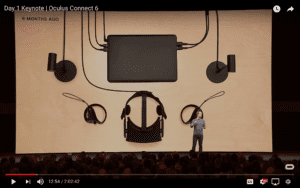
After watching the entire video of the opening keynote of Oculus Connect 6 Developer’s conference, I was really impressed by the vision the Oculus and Facebook team have for VR: many of the endeavors they are taking on now are vivid examples of what a “Mirror World” can be in the future. The three keywords that many of the speakers used are “proximity”, “diversity”, and “presence”. And the goal for VR, they claimed, is to allow people from anywhere (proximity) to do many things (diversity) together (presence).
From the presentations of different departments at Facebook and Oculus, these goals are partially achieved with the current versions of Oculus devices. My impression is that “proximity” is most readily achieved and “diversity” of experiences and content is growing fast, while “presence” requires further development on both hardware and software.
The new releases that caught my attention were “Oculus Link” that links Quest to PC so that Rift content can be seen on Quest. Many Go apps are also being transferred to Quest, so it seems Quest, especially the next version with hand-tracking, will likely be the flagship model for a long time.
Another interesting new release is Horizon, which sounds like a VR version of Facebook, with gaming and design experiences built-in similar to some social games. It sounds like a virtual part of the Mirror World depicted by Kevin Kelly. But considering one speaker talks about developing the “real world index” at the Reality Lab of Facebook. I think the team certainly has the ambition to create a true AR mirror world of our reality.
However, such rich-detail mirror world also comes with security and privacy concerns. While VR and AR allow people to interact with each other in an easier way than ever, this platform is also more prone to Internet attacks and manipulations. When people rely on information that automatically overlays on reality and stop to check for themselves, security and trust will have a new meaning.
Two more comments on what I think the conference really wants to convey: one is that VR experiences need to be “natural”. The addition of hand tracking to Quest and Facebook’s acquisition of CTRL-Labs both imply a future of VR with fewer pieces of hardware, and more human-natural interface. Another point is “more entry points”, Facebook is using its own social network, its workplace subsidiary, as well as fan community like Star War to promote the VR experiences and utilize its network effect to attract more users to try Oculus.